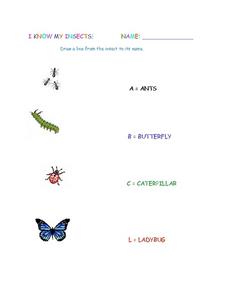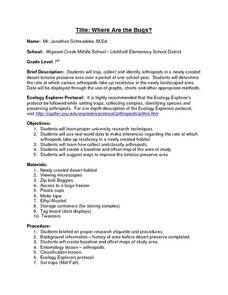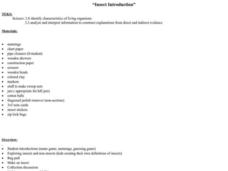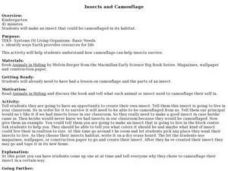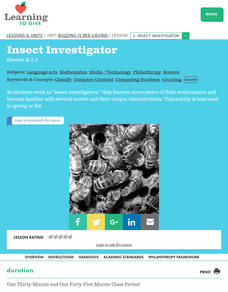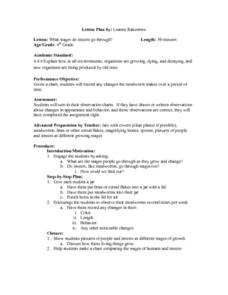Curated OER
Megabeasts
In this biology worksheet, students use their mathematical skills to create a three dimensional scale model of an ancient insect. They draw a diagram of their insect and label it with as much information as possible.
Curated OER
Bugs Word Search Puzzle
In this science word search worksheet, students locate 39 words that are related to insects. They find words that are given in a word bank at the bottom of the page which include aphids, lady bugs, stink bugs, and assassin.
Curated OER
Bees and Wasps
In this biology worksheet, students look for the details that are common to the insects. Then they label the parts for the two diagrams.
Curated OER
Adaptations for Survival--The Spittlebug
In this adaptations for survival worksheet, students list 2 reasons why the foam secreted from spittle bugs help the insect survive. Students view 2 pictures of spittle bugs and determine which one is more visible to passing birds...
Curated OER
The Honey Bee Body
Students construct a paper honey bee to learn the six major parts of a bee and other insects. They compare their own body parts to those of bees. They utilize activity sheets that are imbedded in this plan.
Curated OER
I Know My Insects!
In this insect matching worksheet, young scholars identify the insect pictures and then draw a line from the insect to its name. Students match 4 insects.
Curated OER
Plants and Ecosystems
The relationships within and between ecosystems can be explored. after examining an area for living and non-living things students complete the same examination in the forest ecosystem. Students identify abiotic and biotic elements in an...
Curated OER
Plant Parts and their Function
Discover why plants are important to our world. View plant parts and categorize them as stems or buds. Students do a cut and paste of pictures of plants into correct categories. Students also plant a carrot top,and record the growth and...
Curated OER
Animal Food Chains
An engaging, informative, and colorful presentation focuses on food chains. Learners view many great photographs of animals, and must do some critical thinking regarding an animal's place in a food chain, and whether an animal is...
Curated OER
Animals Around the World
Students study different kinds of animals and what group they belong to. In this animal classification lesson students view different animals and sort them by what group they belong to, for example a snake is in the reptile group.
Michigan State University
Wanted Dead or Alive
Wanted! Pests are on the loose! Here, class members create a wanted poster highlighting one pest. Posters includes a picture, description, and signs of pest activity.
Curated OER
Where Are the Bugs?
Students trap, collect and identify arthropods in a newly created desert tortoise preserve area over a period of one school year. They determine the rate at which various arthropods take up residence in the newly landscaped area. Data is...
Curated OER
Taking a Micro Hike
Students investigate organisms by searching soil on their school ground. In this insect life lesson, students utilize field guides to help identify the organisms found in a rotting log on their campus. Students photograph any insects...
Curated OER
Insect Unit
Fourth graders study the lives, and features of insects in the series of lessons that make up this unit.
Curated OER
Insect Matching
Third graders match insects to the proper order based on the characteristics. They culminate their study of the orders that insects belong in by looking at insects with magnifying glasses.
Curated OER
Adopt-An-Insect Project
Pupils create a school-wide insect collection investigate the insect world. For this project, each grade level "adopts" specific orders of insects, collect specimens, create classroom collections, and complete related activities.
Curated OER
Insect Introduction
Second graders investigate insects and non-insects by creating their own definitions. They complete a series of activities relating to insects.
Curated OER
Insects and Camouflage
Students create an insect that can be camouflaged in its habitat. They study how camouflage can help insects survive.
Curated OER
Munching Insects
Students design an experiment to discover what types of plants particular insects prefer. They comprehend that insects eat only specific plants and that this has particular implications for noxious weeds. Students observe and collect...
Curated OER
Insect Investigator
Students examine and identify common insects. They observe these insects in their environment and keep track of how many they see. They use magnifying glasses and special hats to get into the role of an inspector.
Curated OER
Insect Condominiums
Fourth graders design an insect home using recyclable materials making sure that the organism's needs are met. They study the concepts of niche, habitat and survival requirements.
Curated OER
Insect Biodiversity
Students observe the process of transect sampling using insect nets, to get a chance to compare the presence of different species and populations in various vegetational areas. They study the different specimens caught and compare their...
Curated OER
What Stages Do Insects Go Through?
Fourth graders observe mealworms over a period of time and record any changes they observe. They record any changes in color, length, behavior, and any other noticeable changes, identify the stages of the mealworms, and create a chart...
Other popular searches
- K 2 Life Science Insects
- Science Insects
- Parts of Insects Science
- Life Science Insects
- Science Spiders vs Insects
- Esl Lessons Science Insects
- Esl Science Insects








